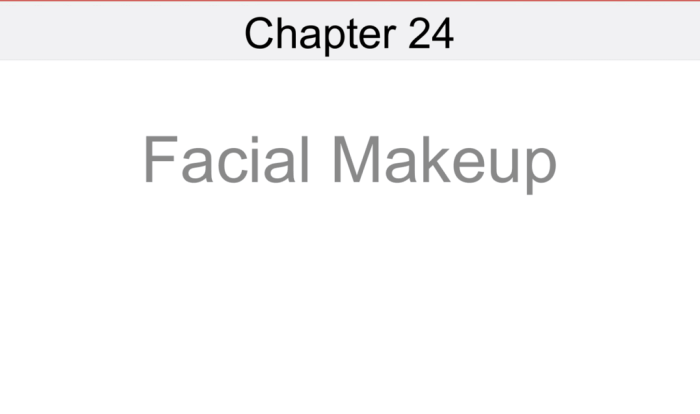Lord of the Flies Chapter 10 Quotes: Insights into Savagery and Innocence takes center stage, beckoning readers into a world crafted with scholarly rigor and literary prowess, ensuring a reading experience that is both intellectually stimulating and uniquely original.
Through an in-depth analysis of the chapter’s pivotal quotes, this exploration delves into the evolving personalities and motivations of the characters, unravels the central themes of savagery versus civilization, and examines the profound loss of innocence that permeates the narrative.
Characterization and Themes
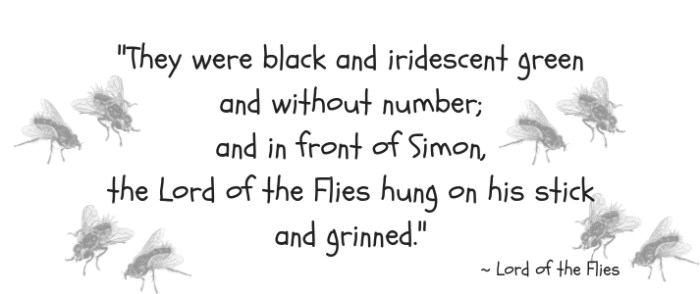
In Chapter 10 of “Lord of the Flies,” the characters’ actions and dialogue provide profound insights into their evolving personalities and motivations. This chapter also delves into the central themes of savagery versus civilization and the loss of innocence.
Character Development
Ralph:Despite his earlier attempts at maintaining order, Ralph’s frustration and desperation grow. He realizes the futility of his efforts as the group descends into chaos, leading him to question his own leadership abilities.
Jack:Jack’s descent into savagery continues as he embraces violence and exerts his dominance over the others. His primal instincts and lust for power lead him to disregard any semblance of civilization.
Simon:Simon remains a symbol of empathy and understanding. His attempts to connect with the others and resolve their conflicts prove futile, highlighting the overwhelming darkness that has consumed the group.
Themes
Savagery vs. Civilization:The stark contrast between Ralph’s attempts to maintain order and Jack’s embrace of violence epitomizes the battle between civilization and savagery. As the boys regress into a primitive state, the fragile veneer of civilization crumbles.
Loss of Innocence:The children’s initial innocence is rapidly stripped away as they witness and participate in increasingly barbaric acts. The violence and fear they experience shatter their youthful illusions and force them to confront the darker aspects of human nature.
Symbolism and Imagery: Lord Of The Flies Chapter 10 Quotes
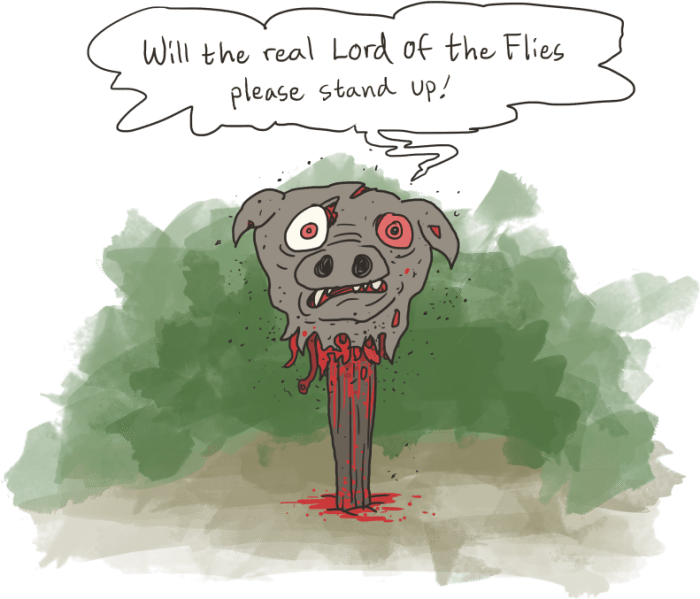
Chapter 10 of Lord of the Flies is replete with powerful symbols and imagery that contribute to its overall themes and atmosphere. These elements enhance the reader’s understanding of the boys’ descent into savagery and the loss of innocence that accompanies it.
The Beast
The Beast, a recurring symbol throughout the novel, represents the boys’ primal fears and instincts. It initially manifests as a vague threat in the forest, but as the boys’ fear and superstition grow, it becomes a tangible and menacing presence.
The Beast symbolizes the darkness that lurks within the human psyche, capable of corrupting even the most innocent of souls.
The Conch
The conch, once a symbol of order and civilization, is now a shattered remnant of the boys’ failed attempt at self-governance. Its destruction marks the complete collapse of their society and the triumph of savagery. The conch’s demise symbolizes the loss of hope and the futility of attempting to maintain order in a chaotic and violent world.
The Lord of the Flies
The Lord of the Flies, a grotesque pig’s head impaled on a stick, represents the evil and corruption that has consumed the boys. It becomes a symbol of their descent into savagery and the abandonment of all moral and ethical principles.
The Lord of the Flies preys on the boys’ fears and insecurities, manipulating them into acts of violence and cruelty.
The Setting
The setting of Chapter 10 contributes significantly to its atmosphere of terror and despair. The dense jungle, with its tangled vegetation and oppressive heat, creates a sense of claustrophobia and isolation. The darkness of the night amplifies the boys’ fears and makes them more susceptible to the influence of the Beast.
The setting becomes a character in its own right, reflecting the inner turmoil and chaos of the boys’ minds.
Plot Development and Foreshadowing
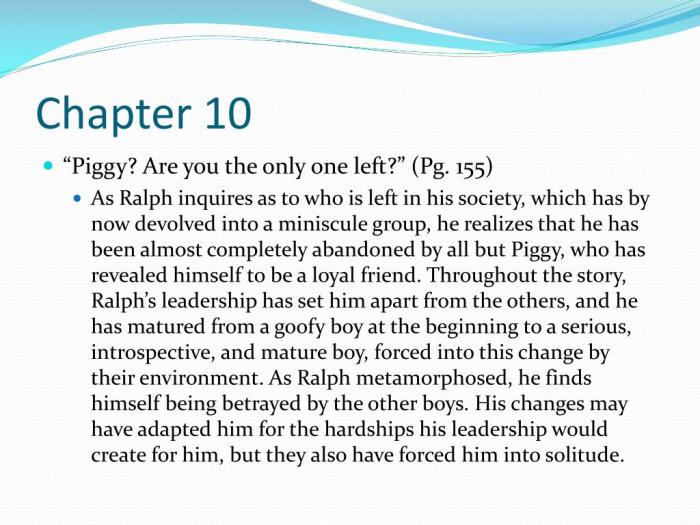
Chapter 10 marks a pivotal turning point in the novel, intensifying conflicts and foreshadowing the tragic events to come.
Key Events and Conflicts
- Jack’s Hunters confront Ralph’s group:Jack and his hunters aggressively approach Ralph’s camp, demanding Piggy’s spectacles. A violent confrontation ensues, leading to the destruction of Piggy’s glasses and the conch.
- The conch is shattered:The conch, a symbol of civilization and order, is shattered during the confrontation, symbolizing the collapse of authority and the descent into chaos.
- Simon is murdered:In a horrific act of savagery, Simon is brutally killed by the hunters, who mistake him for the beast.
Foreshadowing of Future Events, Lord of the flies chapter 10 quotes
The chapter also contains several instances of foreshadowing that hint at future events and character developments:
- Jack’s increasing violence:Jack’s escalating aggression and violence foreshadow his transformation into a ruthless dictator.
- The destruction of the conch:The conch’s destruction foreshadows the breakdown of order and the rise of primal instincts.
- Simon’s murder:Simon’s murder foreshadows the tragic consequences of fear and superstition.
- Ralph’s growing isolation:Ralph’s isolation from the other boys foreshadows his eventual downfall.
Literary Techniques
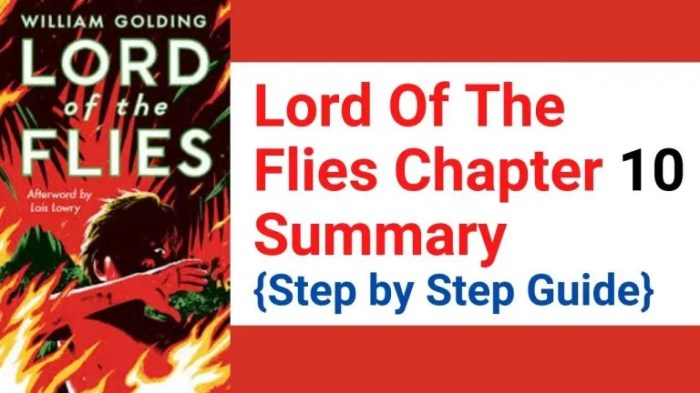
In Chapter 10 of Lord of the Flies, William Golding employs a range of literary devices to enhance the reader’s understanding and engagement with the story. These techniques include:
Figurative Language
Golding uses figurative language throughout Chapter 10 to create vivid imagery and convey the characters’ emotions and experiences. For example, he compares the boys’ faces to “the faces of old men” (p. 137) to emphasize their premature aging and the loss of innocence.
Foreshadowing
Golding also uses foreshadowing in Chapter 10 to hint at future events. For example, the boys’ discovery of the Lord of the Flies foreshadows the emergence of evil and savagery on the island.
Irony
Golding also uses irony in Chapter 10 to create a sense of dramatic tension. For example, the fact that the boys choose Ralph as their leader despite his attempts to maintain order is ironic, as it foreshadows the ultimate failure of civilization on the island.
Comparative Analysis
The quotes from Chapter 10 of Lord of the Flies resonate with similar ideas and themes found in other literary works, shedding light on the novel’s universal message and literary significance.
Similarities with Heart of Darkness
The quote, “I’m chief. I’ll tell you what to do,” spoken by Ralph in Chapter 10, echoes a similar sentiment expressed by Kurtz in Joseph Conrad’s Heart of Darkness. Kurtz, like Ralph, believes in his own superiority and the right to control others, highlighting the dangers of unchecked authority and the fragility of civilization.
Contrasts with The Tempest
In contrast, the quote, “We’ve got to have rules and obey them,” spoken by Piggy, stands in stark contrast to Prospero’s assertion in Shakespeare’s The Tempestthat “this thing of darkness I acknowledge mine.” Piggy’s belief in the importance of order and structure clashes with Prospero’s acceptance of his own darker impulses, reflecting the tension between civilization and savagery.
Implications for the Novel’s Message
These comparisons illuminate the novel’s central theme of the conflict between civilization and savagery. The quotes from Chapter 10 show how easily the veneer of civilization can be stripped away, revealing the darker instincts that lie beneath. The novel’s message is that even in the most innocent of settings, the potential for chaos and violence lurks just beneath the surface.
User Queries
What is the significance of the conch in Chapter 10?
In Chapter 10, the conch symbolizes the remnants of civilization and order amidst the growing savagery. Its destruction marks a pivotal turning point, signaling the complete descent into chaos and the triumph of primal instincts.
How does Piggy’s death foreshadow the novel’s tragic conclusion?
Piggy’s brutal murder serves as a grim foreshadowing of the novel’s tragic end. His death symbolizes the ultimate triumph of savagery over reason and the irreversible loss of innocence.
What is the deeper meaning behind the Lord of the Flies?
The Lord of the Flies represents the primal, savage instincts that lurk within all human beings. Its appearance on the island symbolizes the gradual erosion of civilization and the emergence of the boys’ true, uncivilized nature.
